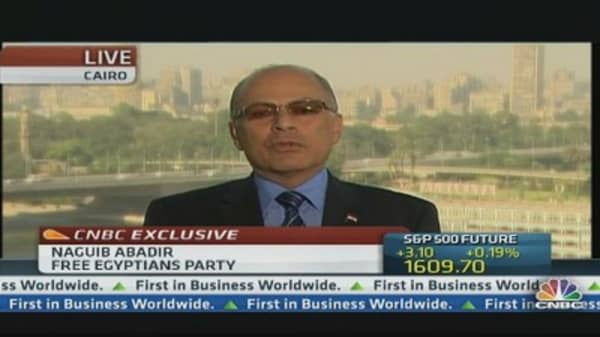Competing rallies in defense of the government are taking place elsewhere, in some ralliers lining up with sticks and improvised helmets. Participants have vowed to use all means necessary to protect the head of state, and his palace.
It's been a roller coaster year for Mursi, shaken by a series of often-contentious decisions in an apparent attempt to monopolize his grip on state institutions. It has left most of the opposition, comprised of known figures such as Mohamed El-Baradei and Amr Moussa, on the sidelines of the political process.
In an interview with British newspaper The Guardian on Sunday, Mursi said there would not be a second revolution, and that he was "very confident" the army would not have to step in to take control.
The military, for its part, was not taking any chances. Helicopter gunships were hovering around parts of the capital Cairo, while tanks and soldiers maintained a visible presence. Security was ramped up around the Suez Canal, one of the world's busiest waterways. Army officials have made it clear they would intervene if violence escalates.
US President Barack Obama told a press conference in South Africa on Saturday he was watching Egypt "with concern", urging all parties to sort out their differences.
US Secretary of State John Kerry said he expected the crowds to grow as the evening continued, and that the US was watching the situation "very, very closely."
Meanwhile, analysts are anxious about the state of the economy, which the IMF sees growing at a lackluster two percent this year.
(Read More: Egypt Clerics Warn of Civil War)
Foreign reserves in the Arab World's most populous country have dwindled, and a currency crisis appeared to be long in the making given the political disarray. Capital Economics wrote in a report last week "there was growing risk the pound undergoes a 'disorderly' devaluation, whereby it could fall by as much as 50 percent in a matter of weeks".
In the last two trading days, the stock exchange has surprised some experts with gains, closing 1.4 percent higher on Sunday. Yet investors have had considerable time to prepare for the long-planned demonstrations. The index has lost 12 percent over the past month.
In a more telling sign of nervousness, the cost of insuring Egypt sovereign debt against default in the credit default swap (CDS) market has risen to record highs.
By Yousef Gamal El-Din, CNBC
Follow Yousef on Twitter for live updates from Cairo: @youseftv




